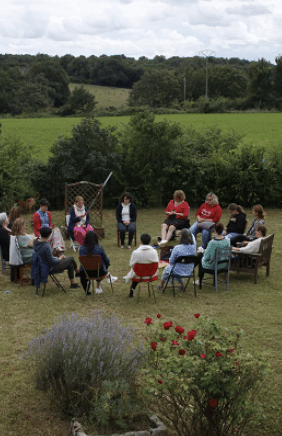Stress is no longer taboo, but it still suffers from preconceived ideas that need to be dispelled in order to put it in its rightful place.
Do we have more stress today than we did 20 years ago?
Yes, without a doubt. There's an element in modernity that has become a life goal: the idea of success, of performance as a guideline. It's a societal injunction: if you perform well, you'll have more money and be able to own lots of things: WORK MORE TO EARN MORE !!!! Always more and faster! This need activates the brain's dopaminergic reward network.
The result? We chase time to earn more and buy more, as if we had to transform ourselves into a fighter jet. This generates more work and fatigue, which paradoxically activates this dopamine network even more, putting us in a vicious circle.
You then exhaust your capacity to produce dopamine! This is the start of the descent into chronic stress...
So does our society weigh heavily on our stress?
Unemployment, the health crisis and terrifying news stories naturally give rise to a feeling of uncertainty that generates stress. And every time we get stressed, we deplete our reserves of magnesium and, in turn, dopamine!
This climate of uncertainty means that people prefer to stay in their job at all costs, for fear of not finding another one.
This professional pressure is also found in the school environment, with the requirement to do well at school in order to get a job. We're seeing more anxiety about the future in younger and younger children, leading to school burnout and even school phobia.
So is stress an ally or an enemy?
Stress is actually a friend.
It's our defence mechanism and it protects us. It gives us the resources we need when we find ourselves in a complex situation. The stress signal releases adrenaline (see graph above).
It's adrenaline, the hormone that triggers the increase in heart rate and brings blood to the brain. This also causes unpleasant sensations, as the blood has to be drawn from somewhere, particularly the digestive tract. Hence the famous lump in the tummy and the stomach upsets often associated with a period of stress (diarrhoea or constipation).
So stress is more of a hindrance?
This signal has not evolved too much and remains archaic. It gives us the resources to attack, flee or hide from a dangerous situation.
Nowadays, this defence system is no longer appropriate: faced with an exam paper, you can't run away, or fight with your fists, or hide in a cave or at the top of a tree.
As a result, all these resources are rather awkward and inappropriate these days.
What's more, the cortisol we've built up in order to flee or fight will concentrate in our muscles, which are contracted for nothing because these days we're very sedentary. So our jaws remain contracted, our backs are contracted too, ...
This is why people can perceive them as enemies. Stress can then diminish the skills we were trying to mobilise: the blood flowing to the brain causes us to lose our train of thought, the blood in the muscles (to run or hit or tense up) creates contractures or tension, and an accelerated heart rate can give an impression of inner panic, which is difficult to channel if, for example, we have to speak in public or write a commentary for an exam.
But it's all a matter of perception, and if we understand how stress works and how it's inescapable, we no longer fight against its effects, but accompany them and try to either extinguish them more quickly or take advantage of them.
This is what I explain in the conference "How to turn stress into an ally" available by following this link: http://wordpress.etincelletavie.fr/conferences-en-ligne/
When should you worry about stress?
When the release of adrenaline is no longer sufficient, when the stress is repeated over time or when the situation seems unresolvable, the body switches over to cortisol. And here everything becomes more complex, because while it helps to maintain tension, cortisol is tiring for the body and extremely violent. We are not made to remain under constant pressure. We are made to experience stress and recharge our batteries in our cave (blue curve below). A different kind of stress and a different kind of rejuvenation. But not stress, stress, stress.... (red curve).
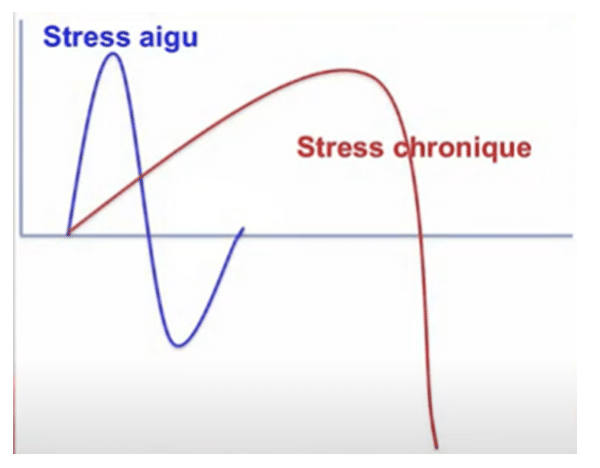
This chronic stress can lead to digestive problems, kidney problems, heart problems, muscular problems and so on. If nothing is done to stop the situation, cognitive (acetylcholine, phosphorus, etc.) and physical (magnesium, etc.) reserves may be depleted. If you notice sleep disturbances, back pain, neck pain, migraines, eyestrain... remember that all these signals are sent by your body to tell you to "STOP".
But our culture has not taught us to listen to our bodies! It's up to us to observe what's going on and restore balance. That's why I'm organising courses in the Charente region, where you can learn to tame your stress and regain your self-confidence in the great outdoors: http://wordpress.etincelletavie.fr/la-grange-aux-etoiles/
Where do you draw the line?
It's that of exhaustion, of burnout (see the neuromediator curve at the beginning of the article). The problem is that you're only aware that you've crossed the border when you've gone beyond it. This is called "burn-in", the phase before collapse when you're deaf and blind to your suffering.
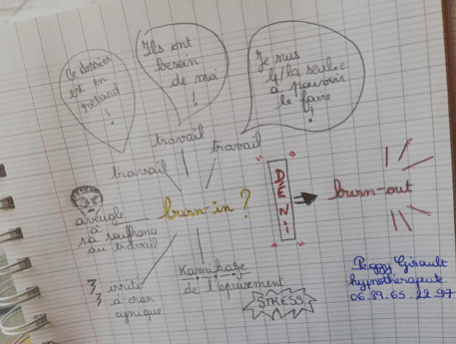
You're like that frog, you don't realise you're dying!
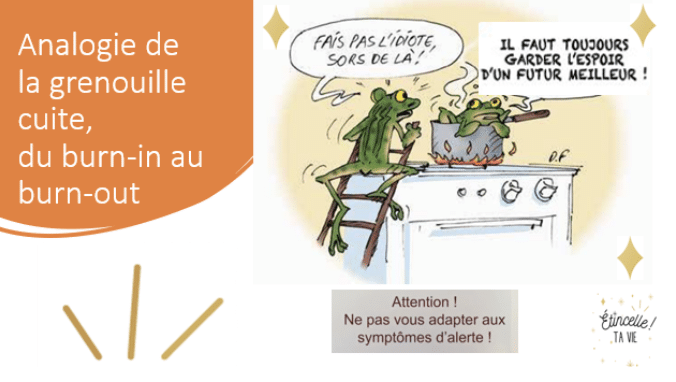
(Slide extract from the conference How to prevent burnout)
We often use the image of a gauge. When everything is in balance, we are in the green.
Sometimes stress peaks can send us into amber, with symptoms such as insomnia, fatigue and attention problems, but we quickly return to green.
-taking care of ourselves,
-by exercising (in particular to release all the stress accumulated in our contracted muscles),
-by going out with close friends (to release oxytocin, a natural antidote to large quantities of adrenaline),
-practising manual activities or mediation (to rebalance the autonomic nervous system)
...
If the stress continues for more than 6 months non-stop, we enter the red zone and, at any moment, we can tip over into the black zone where the brain shuts down everything to protect itself.
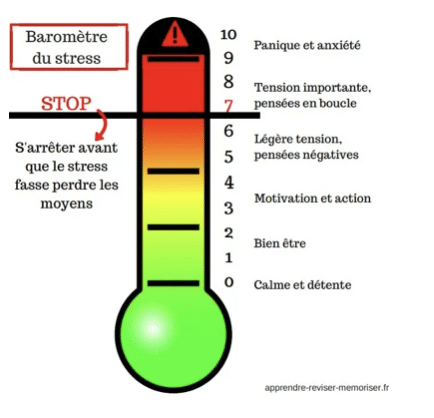
We can also use the image of a rubber band that has been stretched too far and ends up breaking (and that hurts!):
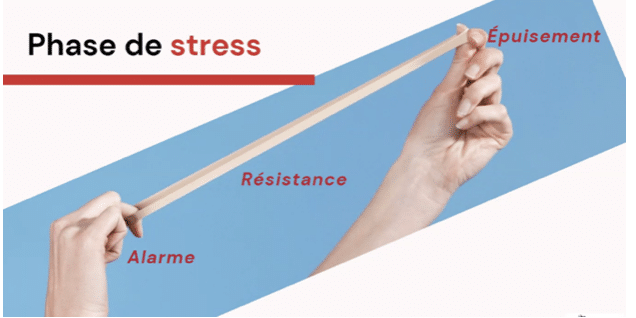
There is a huge element of genetic inequality in this boundary, because we are not all equal when it comes to neurotransmitters (see curve at the beginning of the article). There are no strong or weak people, only people who already have more or less personal and environmental resources to help them cope with stress.
How can you tell the difference between good stress and bad stress?
You really have to learn to listen to yourself, because the differences are subtle and stress short-circuits the areas of reasoning and organisation of thought.
Good stress is transient and brief. After a few restless nights, if you feel a shift in your mood, it's no longer good stress. If you don't have the answers to get out of the situation, ask for help for 2 reasons:
-Asking for help releases oxytocin, a hormone that is an antidote to stress.
-Asking for help does not reveal weakness, but rather the strength to recognise one's limits, as every human being has them.
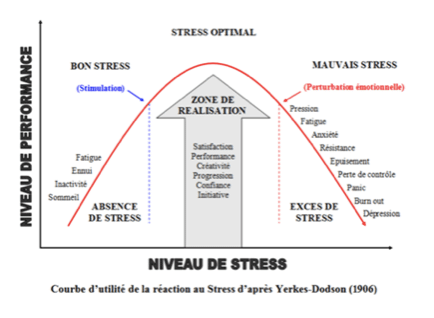
Is stress sufficiently well managed today?
I don't think so... it's often downplayed, reduced to the person's personality characteristics. I end up with clients whose self-image has been shattered, because they've been told that if they can't cope, they must be a problem. See Kikka's novel "Je ne te croyais pas si fragile".
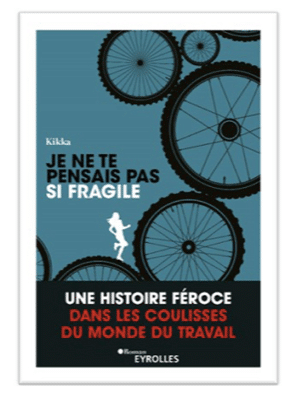
Stress is a natural function of the body, but that doesn't mean it's normal to feel it frequently. You have to learn to read it, understand it and adapt to it, but to do that you need the right tools. If there were courses at school on stress management and listening to your bodyour society would surely be better off. That's why I propose :
–courses at La Grange aux Etoiles to teach adults all this and more
–innovative training courses in schools for teachers and pupils
How is stress treated?
The first step is to provide information and training. Hence my conference How can you turn stress into an ally?
Because you don't treat stress, you treat the consequences of long-term stress or ineffective mechanisms.
Then, if you're feeling orange or red, there's a range of tools like
-cardiac coherence (the effects of which are measured with the cardicheck in my surgery) https://www.so-check.com/cardicheck )
–in-office or teleconsultation hypnotherapy (LINK TO MY DOCTOLIB)
–massage as suggested by magali (massages to release oxytocin, a natural antidote to stress, and to release dopamine)
–learn a new way of organising your daily life (see the 30 small steps in the video clips in the Members' Area LINK)
As a coach and therapist, I work with you to identify the issues at stake and resolve them to restore balance.
Working on emotions is key: learning to put into words what you are feeling also helps others to help and yourself to identify your needs.
In the burnout zone, treatment needs to be more comprehensive, involving a doctor, a psychiatrist and a therapist, such as myself, who specialises in stress and burnout. The pervasive symptoms and lack of resources leave little room for action, and you need to act quickly, very quickly.
Is it possible to cope on your own?
In absolute terms, yes, but I would just say "Why? There's this injunction that wants us to think that facing and fighting alone is something more courageous and admirable than doing it with the help of several people. Yet humans are gregarious and function in packs, in groups, we are social beings (and we have seen clearly with successive confinements just how inhuman isolation is). Humans need each other. We develop together, we grow by learning from others, and we have done so from our earliest childhood. We are not solitary animals.
If you want to learn, tame your stress, a course at La Grange aux Etoiles will be tailored to your needs as we will be in groups of 6 people, a group large enough to create social relationships and small enough to be accompanied as closely as possible to each person's needs.
If the symptoms of stress become bothersome, talk to as many people as you like, don't remain alone. By daring to open up, despite this societal rule, you will discover that many people have been through the same thing and will surely have advice, techniques, good addresses to give, or will simply be sympathetic and willing to listen. And that's an important part of getting back on track, feeling listened to and understood.
